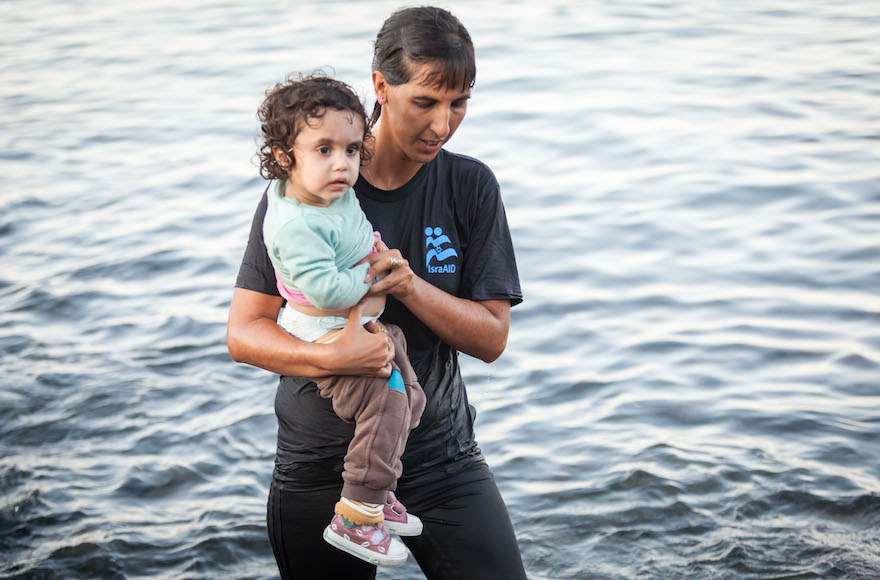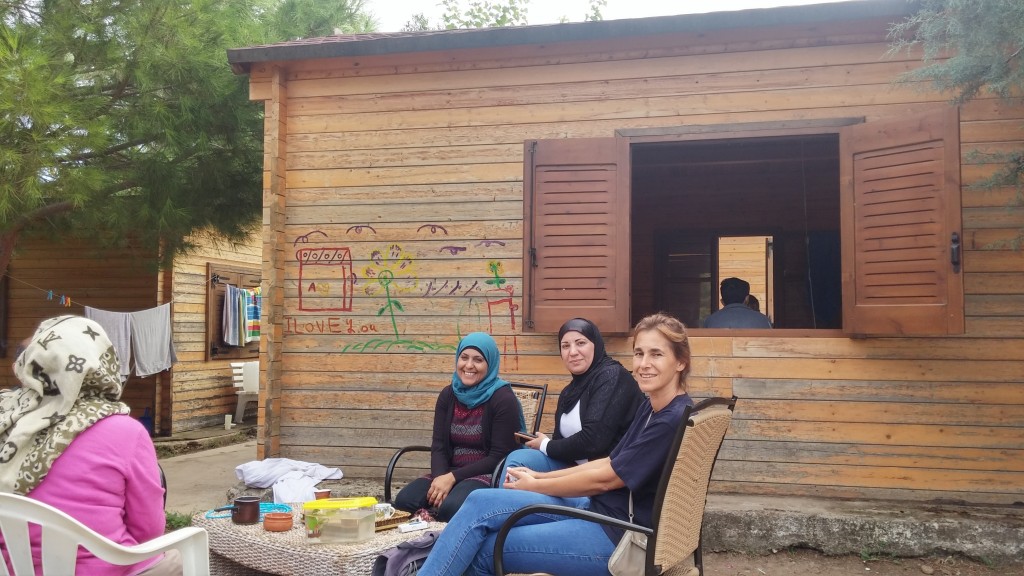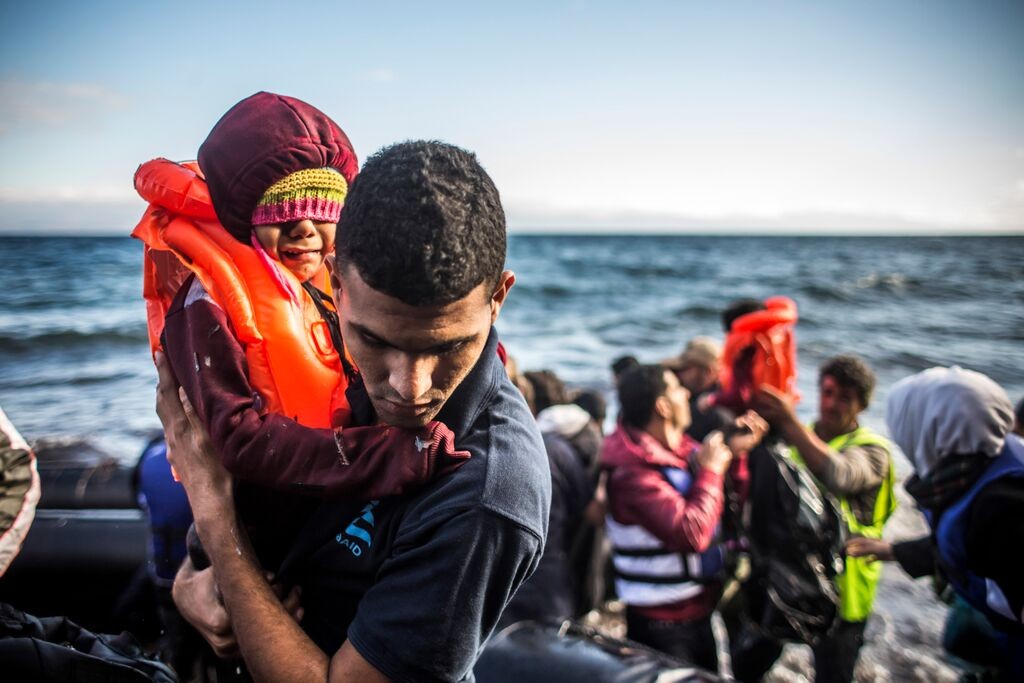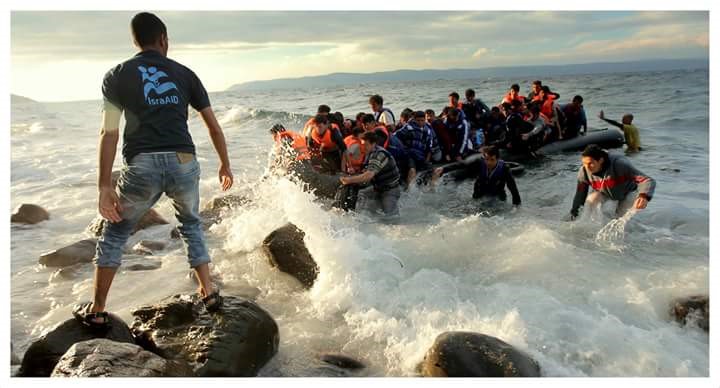A trip to Greece with the Israelis who are helping Syrian refugees.
As boat after boat arrives at the Greek island of Lesbos, the refugees aboard are met by a cacophony of languages from aid workers offering help. But there is only one team of aid workers from the Middle East that can talk to these refugees from Syria, Iraq, and elsewhere in their own language. To their surprise, it is the Israeli team.
“It feels like I dreamed it,” said a bemused 26-year-old man from Damascus. “I never thought an Israeli would treat me.” His wife had just received medical help from IsraAID, a humanitarian aid agency that started working on the European refugee crisis in September. It currently has a team in Lesbos and another on the Serbia-Croatia border.
The Israeli team checked his wife, who is nine months pregnant, as she stepped off the boat, and took her to the hospital for emergency treatment. “I wouldn’t have known that she was not okay, and because of them I knew to get her attention,” he said.
Lesbos lies on a stretch of Greek coastline that faces Turkey. And it is from Turkey that the refugee boats are dispatched by cynical human traffickers. They will pack 50 people into a boat meant for 20 and take U.S. $1,700 from each. Then they designate a driver from among the refugees, and take no further interest in whether they survive or sink. Piles of abandoned boats and lifejackets give a sense of just how many thousands of refugees have passed through here in recent weeks.
Two members of the IsraAID team—a nurse and a doctor—are stationed on the shore night and day, and race to meet every boat that arrives. If the weather is bad and the boats stop 10 to 20 meters from shore, they wade out to carry children and help the elderly. If the weather is good, they wait on shore with blankets and food. Then they give IV drips to the dehydrated and treatment to the injured. The refugees are usually relived to find aid workers who speak Arabic, and bombard them with questions about the Greek bureaucracy’s procedures for refugees.
IsraAID is an Israel-based organization mostly funded by Jewish donors from both Israel and the Diaspora, and the group certainly gets around. It has gone on missions to Nepal after this year’s earthquake, Washington state after last year’s wildfire, and Haiti after a devastating 2010 earthquake. But its Israeli origins have never been as relevant as they are to this mission.
This is for two reasons: First, the fact that Israel has a large Arabic-speaking population means the country’s social work and medical professions are trained to provide Arabic-language services. Second, because of Israel’s long history of conflict, it has well-trained experts in crisis situations.
As the medics deal with the boats as they arrive, Tsofit Goren is an hour away in Mytilini, the capital of Lesbos. She visits refugee camps where she provides psychosocial support. This means helping refugees deal with their trauma and acclimate to their new reality. Goren, a Jewish mother of two, was born in Israel, grew up in America, and now lives on a kibbutz in the Negev desert. Growing up bilingual gave her a flair for languages, and after years as a social worker in a municipality that serves Israeli-Arabs, she is fluent in Arabic. She sits on the floor of a tent in the Pikpa camp, wearing a blue t-shirt with an artist’s rendition of the Israeli flag. She speaks Arabic faster than most of the teenagers as she encourages them to discuss their feelings about the voyage they have endured.
There is a suitcase in the middle of the tent and pieces of colored paper scattered on the floor. Goren asks the teenagers which experiences and memories they want to take when they leave the camp, and which they want to leave “closed” in the suitcase. For most of these teenagers, this is the first time they are able to discuss their traumatic experiences.

Tali Shaltiel, an Israeli physician, taking a Syrian child from a dinghy that arrived at a beach on the Greek island of Lesbos. Photo: Boaz Arad / IsraAID
One boy is more eloquent than the rest, and more grateful for the chance to talk. He is a young Iraqi man named Abdullah, and his story is gripping. Aged just 17, he was put in charge of driving a boat from Turkey to Greece. He’d never taken charge of a boat before. He felt the burden of providing for the safety of dozens of people, young and old. Then he started, his inexperience was evident, and the boat circled several times. The passengers started yelling at him. So he sat down and said that if they didn’t calm down, he wouldn’t drive the boat.
He is here because of ISIS. The terrorist group ordered his father to work for them. His father refused, and the family was forced to flee their home. Abdullah went ahead of the rest of the family with his father, scouting the way to Germany. But they are stuck in Greece while his father receives medical treatment. Abdullah gave an impromptu performance of rap songs he has written about his ordeal.
Goren has a wad of pictures drawn by young children. They come from other sessions she has run, and they display some haunting images. One girl drew her home being bombed by a plane belonging to the Syrian regime.
When Goren isn’t running sessions, she is often sitting with refugees one-on-one, helping them with their personal crises. “It’s the right time in their journey for therapy,” she explains. “It’s more about saying that this is a normal reaction to an abnormal situation, giving coping mechanisms, and helping people find their resilience and strength.”
Wherever you see Goren in Lesbos, you are also likely to see Warda Alkrenawy. They are a fascinating contrast. Where Goren is invariably dressed in a t-shirt and jeans, Alkrenawy wears long sleeves and a hijab. She too is a social worker and a member of the IsraAID team. The two women visit camps together, run sessions together, eat together, and share a modest hotel room.
Alkrenawy volunteered for the mission not only to help refugees, but to “make a bridge between different worlds.” She soon realized, however, that the cooperation would be between her and her Jewish colleagues would be far more intimate than even she imagined.
In a quiet cemetery on the island, three graves tell the unusual story of an Arab woman and a Jewish woman who took on a task that went well beyond their remit as aid workers. A refugee ship had foundered and three female bodies were found. Although they could not be identified, “The hospital didn’t have space to keep them in the morgue and decided to bury them,” Alkrenawy says. Aid workers became aware of the situation, and wanted to bury them in accordance with Muslim tradition. “They were looking around for a Muslim woman and I was the only one there.”
Alkrenawy had never been to a funeral and never touched a dead body. But Tali Shaltiel, a Jewish doctor, helped her. Together they prepared the bodies in traditional shrouds. “I cried after the first body and then said to myself that I need to be strong,” Alkrenawy said, adding that Shaltiel regarded the task as a “mitzvah,” the Hebrew word for a religious injunction or good deed.
One of the deceased was just eight years old. The others were 35 and 20. Alkrenawy says that the cold flesh of the bodies was “something I’ve never felt on my hands before, and their blood was dripping on me.”

IsraAID volunteers Warda Alkrenawy (in blue headscarf) and Tsofit Goren sit with residents of the refugee camp. Photo: Nathan Jeffay / The Tower
Death is a daily reality for the IsraAID team, and while dealing with bodies is mostly outside their remit, breaking the news of death isn’t. In fact, because of their linguistic skills and expertise in bereavement, other teams tend to call in the Israelis to deliver sad news.
The IsraAID staff bring “experience and stability” to the Pikpa camp, says Yannis Anagnostou, its mental health and psychological services coordinator. “There are certain cases like people dealing with loss and bereavement where they can help a lot,” he says.
After one ship was badly damaged, Goren and Alkrenawy received a call from one of the refugee camps. The team asked them to inform a single mother with six children that one of them was dead. “Intuitively, most people try to say the news slowly, but you say ‘he’s dead, he died,’ so there is no room for misunderstanding,” explains Goren. “She started crying and we asked her if she’d like to see the body and identify it at the morgue. She almost ran out of the bed. She saw the baby and kissed him goodbye.”
On another occasion, they had to tell a family that their nine-year-old daughter was dead. They informed the husband of the death and showed him a picture of the body. The mother said that she had her doubts about the boat, but that the traffickers grabbed their daughters and put them in, forcing her to follow. Alkrenawy managed to arrange financial aid for the woman and her remaining children from the United Nations. This allowed them to stay in the hotel where the IsraAID team is based. She then sat with the woman every day, helping her to process her feelings. “This woman said: ‘I want to tell you something. The day you were here to tell me that Lia was dead, I felt like you were my sister and this gave me so much power and support.’”
Upon arrival to Greece, most Syrians head for the large Karatepe refugee camp. There, the long lines of people waiting for documentation never seem to end. Some people are too exhausted to queue, and fall asleep on the concrete before they even make it to the tents. There was a rare happy moment here on the Muslim festival of Eid al-Adha in late September. Per holiday tradition, IsraAID toured the tents handing out candies, and Alkrenawy led the traditional holiday songs in Arabic.
On the coast, an IsraAID nurse and doctor are stocking their rented car with supplies. They can see the flimsy boats several minutes before they arrive, and ready themselves to help. When the boats come into earshot you can hear the talking and shouting on board. The aid workers can sense the atmosphere, which varies greatly depending on the conditions of the voyage. When the journey has been relatively smooth, there is a sense of relief. But when instead of one hour it has taken four, five, or six—due to the driver, winds, or problems with the boat—people arrive anxious, dazed, and sometimes barely conscious.
When this happens, it can even be hard for parents to keep hold of their children. IsraAID nurse Malek Abu-Gharara actually caught a baby after the father lost his footing and dropped the infant. Abu-Gharara is a Muslim from the Israeli city of Rahat. His partner is Irit Adler, a Jewish doctor from Tel Aviv, who has just finished her internship at Barzilai Medical Center in Ashkelon.
It’s rare to see a doctor deferring to a nurse, but Adler is full of respect for her partner. “Arabic is the most important tool we have to help, even medically, because when you understand people, you can help them,” she says. “We’re from the same area. We understand them completely and have the language.”
Adler doesn’t speak Arabic, but Abu-Gharara’s language ability allows both of them to make quick diagnoses, help the distressed, and guide the refugees through the often-confusing procedures they face.
Sometimes it even solves problems to comical effect. Abu-Gharara once received a late-night call from a Norwegian team regarding a patient they were treating. “We’re losing him,” they told him. In fact, it was all a case of mistranslation. The team had understood from the man that he had heart problems. “We went to the camp and spoke to him and he said that he had headaches and leg aches,” said Abu-Gharara. The doctors eased off the patient and he made a quick recovery.
Sadly, the laughs are few and far between. “It’s very challenging physically and emotionally,” admits Adler. “We work very hard and there’s lots of crying. And while we help lots of people there are people you can’t help, and if supplies are over its hard to see a hungry child and have nothing to offer him.”
While working in the camps, Alkrenawy chose to stop wearing her Israeli flag t-shirt, because she felt it was distancing her from the refugees. But Abu-Gharara is happy to wear his. He says he may have liked to volunteer with an Arab aid team, but there were no options open to him. “I’m proud there’s an Israeli organization that comes to help people. And on the other hand, the fact there aren’t Arab organizations from Arab countries that are here to help is sad,” he says.
Abu-Gharara also enjoys the conversations it stimulates with refugees and fellow aid workers, who express surprise that there are Arab citizens in Israel. “They say, ‘You’re Arab, how is it that you live in Israel?’ They think we don’t live together. It’s good they know we live together and work together.”
The news site Pls48.net, short for “Palestinians of ‘48,” the Palestinian nationalist term for Arab citizens of Israel, ran a feature on Abu-Gharara, making his work in Greece well-known back home. “My family is proud of me and so are my friends and neighbors,” he says.
To Adler, if refugees question their antagonism to Israel following an encounter with her, it’s a welcome addition to her humanitarian goals. “It’s not the reason that I care,” she says, “but it’s a bonus.”
In recent years Israeli aid abroad has grown considerably. It includes both state and non-governmental initiatives like IsraAID, the rescue and recovery group ZAKA, the medical organizations Magen David Adom and United Hatzalah, and others. After the Nepal earthquakes earlier this year, these four groups were active on the ground, and the Israeli military set up and ran the largest field hospital in the area.
The increase in non-governmental activity is related to two developments within Israel itself. One is the growth of the ultra-Orthodox community. As it has grown, it has become increasingly organized. As a result, it has founded medical organizations like United Hatzalah, which is based on the idea that, in ultra-Orthodox neighborhoods, community members can provide medical assistance faster than ambulances from outside. And it has built organizations such as ZAKA, based on religious concerns. Indeed, ZAKA’s original purpose was to collect body parts of terror victims for religious burial. Both of these non-profits have expanded their activity and begun to work internationally.
The second development is the resilience of Israeli society due to the changing nature of Israel’s security threats. This has created a large network of people who can get involved in aid initiatives on the local level. “Once, the soldiers would be on the front line and the casualties would be on the front line,” Goren reflects. “But now it is the civilian population that is targeted so the experience is different.
“The basic assumption now is that in mass war and disaster local government will be the first responder. Every area’s local government has to be able to provide physical support, social support, psychological support, and provide for other local needs.”

IsraAID volunteers rescue Syrian refugees from a dinghy that arrived on the Greek island of Lesbos. Photo: Martin Divisek / IsraAID
The team leader of IsraAID’s Lesbos delegation is Manal Shehade, a Christian-Arab and self-defined “’48 Palestinian” from Nazareth. She thinks that Israel’s experience of conflict makes Israelis well suited for missions like this. “In terms of the psychosocial support, sadly we come from a place where we know conflict and we know trauma too well,” she says. “Every member of our teams has worked with people harmed in conflict.”
Israeli teams tend to be quick starters—the Magen David Adom team was the first foreign medical group to reach Nepal after the April 25 earthquake. Goren thinks that this is because of the Israeli mindset. “It’s part of the Israeli mentality that helps in a crisis,” she says. “What is specifically Israeli about the way IsraAID works is the immediate way it operates. Other organizations here work nine until five, maybe with a night shift. We just respond immediately, and what’s Israeli is the ability to get together in a short time.”
Since IsraAID was established in 2001, it has worked in 34 countries. “We see our responsibility as a nation and as people to respond to humanitarian needs around the world,” says the organization’s emergency response director, Naama Gorodischer.
IsraAID tends to arrive in the thick of a major crisis, but it stays long after press attention has dissipated. “After a month or two months a disaster becomes uninteresting to the world, as media and aid agencies pull out,” Gorodischer laments. “What we try to do is to provide a longer-term response in a sustainable way.”
IsraAID is still active on the ground in Nepal, with 20 staff running an office that offers psychosocial programs. It arrived in Vanuatu in the South Pacific shortly after Cyclone Pam struck in March and currently works there training health providers. And two years after Typhoon Haiyan, it still operates in the Philippines, helping farmers recover from the devastation.
Altogether, IsraAID is currently working in 18 countries. In several, it has established operations that are increasingly being run by local workers, in the hope that it will have a long-term effect on the area. This is occurring with the Japan IsraAID Support Program, which provides Japan’s Tohoku region, devastated by a 2011 earthquake, with targeted post-trauma capacity-building, psychosocial services, and leadership and professional skills training for the young.
There is no end-date set for IsraAID’s operations on Lesbos or the Serbia-Croatia border. The latter operation is intended to help refugees as they continue on their journey. The volunteers in Greece tell refugees where to find their colleagues on the Serbia-Croatia border. Most refugees do so within a week.
Shehade left her previous job at a non-profit that promotes Palestinian entrepreneurship to join IsraAID because “the Syria conflict is very close to home” both physically and emotionally. She comments that even if the boats stop arriving, her work isn’t over. “Our link is for the long run,” she says. “Even if the war ends in Syria, there is still a situation here.”
IsraAID is already starting to explore the possibility of establishing operations in countries where refugees decide to settle, but the IsraAID members insist that they haven’t become players in the crisis and aren’t encouraging immigration to Europe. “I’m not bringing them,” insisted Adler. “I’m just helping them to be safe. It’s the world’s problem, but while they’re here we want them to be safe. The fact that we’re here doesn’t make them come—it just makes them come safely.”
![]()
Banner Photo: Lior Sperandeo / IsraAID






